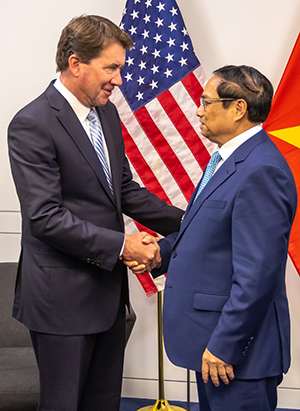A USIP Fact Sheet
Nearly 50 years since the end of the Vietnam War, and more than a quarter-century since the normalization of U.S.-Vietnam relations, Vietnam is emerging as a rising power at the heart of the Indo-Pacific region and an increasingly important U.S. partner. Once one of the world’s poorest and most isolated countries, Vietnam is now a middle-income country with a dynamic, young population and a promising future.
Since joining ASEAN in 1997, Vietnam has played a significant role in regional diplomacy and development. Vietnam’s foreign policy aims to act as a “friend and reliable partner of all countries in the international community.” Vietnam has established strategic partnerships with Japan, China, India, Russia and other countries. The United States and Vietnam agreed on a “comprehensive partnership” in 2013 that was strategic in all but name, including cooperation on economic, security, educational, cultural and war legacy issues. Vietnam’s policy of multiple partnerships has remained intact despite maritime security challenges in the East (South China) Sea and disputes over management of the Mekong River.
Politically, Vietnam is a one-party state ruled by the Communist Party. The People’s Army of Vietnam has significant influence in the political system. Freedom of expression, opinion and speech are guaranteed in the constitution but not implemented in practice. Vietnam’s vibrant civil society and social media face increasing restrictions affecting both informal actors (such as bloggers) and legally registered NGOs. Human rights remain a contentious issue in the U.S.-Vietnam relationship; however, successive U.S. presidents have assured Vietnamese leaders that the United States respects Vietnam’s differing political system.
The Vietnamese government won international recognition for its strict handling of the COVID-19 pandemic in its early stages. Vietnam’s economy has continued to grow at the highest rate in Southeast Asia. Future challenges for the country include how to continue economic liberalization and societal opening while maintaining stability and a relatively low level of inequality.
In September 2023, President Biden and General Secretary Nguyễn Phú Trọng agreed to elevate the U.S.-Vietnam relationship to a Comprehensive Strategic Partnership. This significant achievement underscores the joint commitment to advancing common goals of peace, prosperity and sustainable development.
USIP’s War Legacies and Reconciliation Initiative
The U.S. Institute of Peace engages in research and dialogue examining the extraordinary arc of U.S.-Vietnam relations. In August 2021, USIP launched a multiyear project to foster public education as well as government-to-government and people-to-people dialogue among Vietnamese and Americans. Addressing war legacies — including Agent Orange, unexploded ordnance (UXO) and recovery of wartime remains — is an essential component to the wider work of building a strong bilateral partnership. USIP’s project aims to further advance reconciliation, to sustain U.S. support for addressing war legacies and to highlight lessons from the U.S.-Vietnam experience that could apply elsewhere in the world.
Vietnam Wartime Accounting Initiative (VWAI)
This U.S. government initiative stems from Congress’s landmark authorization in 2021 to assist Vietnam in identifying its war dead, following decades of Vietnamese cooperation to help the United States conduct the fullest possible accounting of missing U.S. personnel. As one of the participating agencies in VWAI, USIP carries out communications, dialogue and veterans’ exchange activities to support the search for and identification of wartime remains from all sides of the war.
Events and Public Education
USIP convenes virtual and in-person seminars featuring prominent speakers from the United States and Vietnam. Our experts also co-organize events with partners around the United States to increase public awareness of the journey toward reconciliation and the ongoing importance of overcoming the consequences of war. In Vietnam, USIP is joining with USAID and the War Remnants Museum in Ho Chi Minh City to curate a new permanent exhibit on U.S.-Vietnamese cooperation to address the human and environmental impacts of UXO and Agent Orange. In collaboration with TDP Cinema Development Joint Stock Company, USIP is producing a documentary film about the cleanup of dioxin contamination at Biên Hòa Air Base for both U.S. and Vietnamese audiences.
Facilitating Dialogue
USIP convenes governmental and non-governmental leaders in Track 1.5 and Track 2 dialogues. An annual dialogue on war legacies and peace in Vietnam, Laos, and Cambodia brings together over 100 participants at USIP’s Washington, D.C., headquarters. USIP partners with the Diplomatic Academy of Vietnam and the Vietnam Union of Friendship Organizations to organize dialogues and workshops in Vietnam concerning government-to-government and people-to-people reconciliation. With Fulbright University Vietnam, USIP leads a series of online youth dialogues and a Youth Leadership Cohort to foster relationships between Vietnamese and American youth, including Americans of Vietnamese descent.

On September 19, 2023, USIP and the Embassy of Vietnam hosted a public event to mark the U.S.-Vietnam Comprehensive Strategic Partnership, featuring Vietnamese Prime Minister Phạm Minh Chính (shown at right), Ambassador Nguyễn Quốc Dũng, and U.S. political leaders including Sen. Bill Hagerty (at left), Sen. Jeff Merkley, and others.